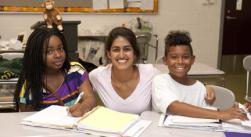February 14, 2013
 Shown above (left to right): Maya (Student), Simran (Teacher), and Jonathan (Student) in a chemistry class. Photo by Spector Photography
Shown above (left to right): Maya (Student), Simran (Teacher), and Jonathan (Student) in a chemistry class. Photo by Spector Photography
Breakthrough Greater Boston (BTGB), a Cambridge-based educational support program that helps students get track towards college and a career, will open its first expansion site at TechBoston Academy in Dorchester this fall. The program, which will double its number of students, has served Cambridge Public Schools for 20 years.
In the past five years, the non-profit has sent 97 percent of their students to 4-year colleges. The inaugural summer program, BTGB’s trademark, will kick off with a July 8 ribbon-cutting ceremony. Site director Anita Roberson is already in the process of recruiting students at TechBoston Academy.
With the March 1 student application deadline approaching, she and her team have been conducting informational classroom presentations to 6th-graders and also one-on-one and small group meetings with both students and families.
“We recognize that we’re a new program in Dorchester and that we don’t have just the reputation that we’re able to live on in Cambridge,” said Elissa Spelman, executive director of BTGB.
After much success in its hometown community, a new site became part of BTGB’s strategic plan. Spelman and the board found that the combination of a strong educational model, success rate for teachers and students, community base, supporters, funding and partners would result in a successful and sustainable expansion, she said.
“Boston was selected for a number of reasons,” said Spelman. “I think maybe most importantly [for] need and recognition that there are a lot of students in the city of Boston who don’t have access to really stellar academic after-school and summer program options.”
“They’re an amazing partner school,” Spelman said. “They’re exactly what we were hoping to find when we set out to expand into a new community.”
BTGB’s model has successfully produced college graduates and professional teachers. Students matriculate between the sixth- and seventh-grades into the six-week summer program. It is the “deepest dive into our programming,” according to Spelman.
Students commit to the program until they graduate high school.
“That’s a big commitment to make,” she added. “But we believe it’s a life-changing commitment to make.”
The 8:30-5 schedule features an academic lineup of literature, writing, science, social studies and math, along with lunch, recess and club time (e.g. chess, step and glee club).
“The kids will often describe it as harder than school but more fun than school, which we appreciate,” Spelman said.
Becoming a part of a community where their peers also want to go to college is special for Breakthrough students, who share the idea “that studying, even in the summer, is cool and a good thing to do with your time.”
The weekly School Year Program consists of academic electives such as genetics, architecture, hip-hop poetry, journalism and spoken word. Homework is included.
“One of the key components of the after-school program is just continued engagement with the Breakthrough community,” Spelman said. “They get to still have regular contact with Breakthrough peers.”
“For us as the program staff, [we are] able to keep our eyes on them and make sure if they need support – academically, emotionally – that we can do that.”
The program also succeeds in its effort to transform urban education by recruiting, training and inspiring the next generation of urban teachers, Spelman noted.
BTGB runs on a “students teaching students” model where all of its teachers are high school or college students. Before they even set foot in a classroom, teachers-in-training participate in research-based training and learn from professional teachers who serve as instructional coaches. They are observed at least three times a week, given advice from the pros, attend conferences and are taught how to teach.
“There’s tremendous support,” Spelman said. “[The method is not] throw them in a classroom and hope their energy wins out. It’s a very structured program for them as well.”
Many student alumni return for the junior teacher program. Junior teachers are paired with other teachers and go through the same training, teach lessons and give one-on-one support to students in class. Many eventually apply to become teachers.
Because teachers are students themselves, Breakthrough students “feel a tremendous bond” with their instructors and can relate to them.
“They get a lot of attention both in an academic sense and then also in a sort of mentoring sense from their teachers,” said Spelman. “I think that’s one of the reasons we succeed in convincing kids to give up their summers.”
“[We want] to make sure we’re succeeding for our students and our teachers,” Spelman said. “What is incredibly important to us is to do this incredibly well.”
For more information, visit breakthroughcambridge.org.


